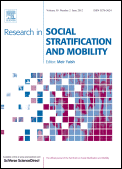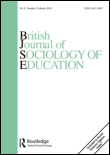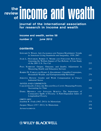
Research in Social Stratification and Mobility
Scope & Guideline
Fostering insights into the fabric of social inequality.
Introduction
Aims and Scopes
- Intergenerational Mobility:
Research exploring how socioeconomic status, education, and other factors are transmitted across generations, including studies on educational attainment, income, and occupational status. - Inequality and Discrimination:
Investigations into the various forms of inequality (e.g., gender, race, disability) and the mechanisms through which discrimination affects social mobility and economic outcomes. - Labor Market Dynamics:
Analysis of labor market trends, including employment patterns, wage disparities, and job quality, particularly in relation to social stratification and mobility. - Education and Social Stratification:
Studies focusing on the role of education systems in perpetuating or mitigating social inequalities, including tracking, school choice, and educational outcomes. - Cultural and Social Factors:
Examination of how cultural norms, social capital, and family dynamics influence individual and group mobility, as well as perceptions of inequality. - Health and Well-being:
Research connecting socioeconomic status and mobility to health outcomes, exploring how inequalities in health can affect life chances and opportunities.
Trending and Emerging
- Intersectionality in Inequality:
A growing focus on how various social categories (e.g., race, gender, disability) intersect to create unique experiences of inequality, indicating an expanding understanding of the complexity of social stratification. - Impact of Globalization:
Research examining how globalization affects social mobility and inequality, particularly in relation to labor markets and cultural exchanges, is becoming more prominent. - Effects of the COVID-19 Pandemic:
An emerging theme that investigates how the pandemic has exacerbated pre-existing inequalities and affected mobility patterns, showing the journal's responsiveness to current events. - Social Capital and Networks:
Increasing attention is being paid to the role of social networks and capital in facilitating or hindering mobility, reflecting a shift towards understanding the relational aspects of inequality. - Educational Innovations and Policies:
Research focusing on contemporary educational reforms and their implications for social mobility is trending, highlighting the importance of education in addressing inequality.
Declining or Waning
- Historical Analysis of Mobility:
There has been a noticeable reduction in studies focusing specifically on historical trends of social mobility, suggesting a shift towards contemporary analyses and immediate implications rather than longitudinal studies. - Individualistic Perspectives on Inequality:
Research that emphasizes individual traits or behaviors as primary drivers of inequality appears to be less prevalent, indicating a move towards more structural and systemic analyses of social stratification. - Regional Studies in Isolation:
Papers focusing on regional disparities without a comparative or contextual analysis are seen less frequently, suggesting a trend towards more integrative approaches that consider global or national frameworks. - Purely Quantitative Analyses:
There seems to be a decline in studies relying solely on quantitative methods without qualitative insights, as there is a growing recognition of the importance of mixed-methods approaches to understand complex social phenomena.
Similar Journals

Journal of Chinese Sociology
Exploring the dynamics of Chinese society and its global impact.Journal of Chinese Sociology, published by SPRINGERNATURE, is a premier Open Access journal dedicated to advancing the understanding of sociological phenomena in China and its global implications. Since its inception in 2014, the journal has become a vital resource for researchers and practitioners in the field of social sciences, achieving a solid Q2 ranking in the 2023 Social Sciences category. The journal's converged years from 2014 to 2024 emphasize its commitment to ongoing research and discourse, while its accessibility ensures that cutting-edge findings are readily available to a diverse audience. With a current Scopus rank of #103 out of 275 in General Social Sciences, the journal plays a pivotal role in promoting interdisciplinary dialogue and collaboration among scholars, students, and professionals interested in Chinese society and its interactions with the world. The Journal of Chinese Sociology invites contributions that explore theoretical frameworks, empirical studies, and innovative methodologies that enrich sociological literature and practice.

Socius
Connecting researchers and professionals to transformative social insights.Socius, published by SAGE Publications Inc, stands as a pivotal Open Access journal in the field of social sciences, having garnered significant recognition since its inception. With an ISSN of 2378-0231, it operates from the United States and is dedicated to advancing our understanding of societal dynamics through high-quality research. Ranking in the top quartile (Q1) among similar journals in the Social Sciences category and ranking 38th out of 275 in Scopus, Socius plays a crucial role in disseminating impactful findings to researchers, professionals, and students alike. Its commitment to Open Access, initiated in 2016, underscores the journal's objectives to enhance visibility and accessibility of research outcomes, promoting a more inclusive discourse on pressing social issues. With converged years extending from 2015 to 2024, Socius continues to establish itself as a vital platform for innovative research and an essential resource for anyone engaged in the exploration of the complex fabric of society.

BRITISH JOURNAL OF SOCIOLOGY OF EDUCATION
Illuminating the Social Contexts of LearningBritish Journal of Sociology of Education, published by Routledge Journals, Taylor & Francis Ltd, is a leading academic journal that focuses on the critical examination of the social dimensions of education. With a significant impact in the field, recognized by its Q1 rankings in both Education and Sociology & Political Science categories, this journal has been an essential resource since its inception in 1980 and continues to influence scholarship through 2024 and beyond. The journal's comprehensive scope invites contributions that explore the complex interplay between education systems and social structures, making it indispensable for researchers, professionals, and students committed to understanding these vital dynamics. While it currently does not offer Open Access, the journal's high Scopus rankings, placing it in the top 21% in Sociology and Political Science and the top 28% in Education, underscore its significance in fostering scholarly discourse and advancing knowledge.

SOCIAL SCIENCE RESEARCH
Exploring Innovative Perspectives in Sociology and Political ScienceSOCIAL SCIENCE RESEARCH is a leading academic journal published by Academic Press Inc. Elsevier Science, dedicated to advancing knowledge in the fields of sociology, political science, and education. With an impressive Impact Factor reflecting its esteemed reputation, the journal consistently ranks in the Q1 category for both education and sociology/political science, placing it among the top in its field. The journal serves as an essential platform for high-quality research, facilitating discourse among scholars, practitioners, and students alike. By publishing innovative studies that span theoretical, empirical, and methodological approaches, SOCIAL SCIENCE RESEARCH contributes significantly to our understanding of social phenomena. Positioned within the competitive landscape of social sciences, it holds a Scopus Rank that highlights its influence, with a percentile ranking of 82nd in sociology and political science. With its commitment to fostering impactful scholarship, this journal is an invaluable resource for those seeking to deepen their engagement with the social sciences. Contributions are peer-reviewed to ensure the highest standards of academic rigor and relevance.

Journal of Demographic Economics
Advancing Insights at the Intersection of Demography and EconomicsThe Journal of Demographic Economics, published by Cambridge University Press, stands as a leading interdisciplinary platform dedicated to the exploration and advancement of research in the intertwined fields of demography, economics, and geography. With an impact factor that reflects its esteemed position—ranking in the Q1 quartile for Demography (2023)—the journal fosters scholarly dialogue through high-quality articles that elucidate the complex interactions between population dynamics and economic trends. Operating under an open access model, the journal ensures that its findings are widely accessible, promoting inclusivity and engagement among researchers, professionals, and students alike. The Journal of Demographic Economics endeavors to bridge gaps in knowledge by publishing innovative and rigorous studies, thereby contributing significantly to both theoretical frameworks and practical applications across various domains. Drawing submissions from a global audience, this journal not only enhances the understanding of demographic transitions but also informs policy decisions and socioeconomic development strategies, making it an essential resource for those invested in demographic and economic research.

Journal of Economic Inequality
Bridging disciplines to tackle economic disparities.The Journal of Economic Inequality is a leading interdisciplinary platform dedicated to advancing the understanding of economic disparities and their implications for society. Published by SpringerNature, this journal has achieved an impressive standing within the academic community, featured in the prestigious Q1 quartile across multiple categories, including Economics, Econometrics and Finance, Organizational Behavior and Human Resource Management, and Sociology and Political Science as of 2023. With an emphasis on high-quality empirical research and theoretical contributions, the journal serves as an essential resource for scholars and practitioners alike seeking in-depth insights into the mechanics of inequality. With a broad scope encompassing discussions across various fields, it provides vital perspectives that influence policy-making and social justice. Researchers will find valuable access to cutting-edge studies and the latest trends in economic research, reinforcing the journal's commitment to promoting knowledge that can lead to significant societal change. The journal operates from the Netherlands, with its editorial office located at CAMPUS, 4 CRINAN ST, LONDON N1 9XW, ENGLAND.

Papeles de Poblacion
Connecting diverse perspectives in population dynamics.Papeles de Población, published by the Universidad Autónoma del Estado de México, is a prominent open-access journal that has been advancing the field of demography since its inception in 1997. With an ISSN of 1405-7425, this journal aims to foster a deeper understanding of population studies through research articles, reviews, and critical analyses that address the complex dynamics of demographic changes, social structures, and their implications. While currently ranked in the fourth quartile of its category in 2023, it serves as a significant channel for researchers, professionals, and students to disseminate and access cutting-edge findings. Open access since 2004, it provides a platform for broader readership and knowledge sharing, thus contributing to the global discourse on population issues. Based in Mexico, the journal is committed to embracing diverse perspectives, emphasizing the importance of regional studies within a global context.

REVIEW OF INCOME AND WEALTH
Advancing Economic Insights for a Prosperous FutureREVIEW OF INCOME AND WEALTH, published by Wiley, stands as a premier journal in the field of Economics and Econometrics, notably ranking in the Q1 category as of 2023. With an ISSN of 0034-6586 and E-ISSN 1475-4991, it offers a platform for innovative research and critical analysis on issues pertaining to income distribution, wealth dynamics, and broader economic theories. Establishing a rich legacy since its inception between 1951 and 1953 and resuming throughout 1955 and from 1957 to 2024, the journal is pivotal for academics and practitioners alike, reaching a significant audience globally. It holds a respectable Scopus Rank of #224 out of 716 in the Economics, Econometrics, and Finance category, placing it in the 68th percentile of its field. Although it does not currently offer open access options, its commitment to disseminating high-quality, peer-reviewed research makes it an essential resource. Researchers, professionals, and students will find this journal an invaluable asset for staying abreast of the latest developments and emerging trends in economic research.

SOCIOLOGISK FORSKNING
Empowering Scholars with Open-Access KnowledgeSociologisk Forskning is a prestigious open-access journal based in Sweden, focusing on the fields of sociology and political science. Established in 1996, this journal has evolved to be an important platform for disseminating innovative research and critical discourse in the social sciences. Published by the Socilogisk Forskning institution, it aims to foster interdisciplinary dialogue and promote insights that address contemporary social issues. With an impact factor that positions it in the Q3 quartile of its category as per the 2023 rankings, the journal ranks #1045 out of 1466 in the Scopus database, reflecting its relevance and contribution to the academic community. Since adopting an open-access model in 2015, it has enhanced the accessibility of its research outputs, allowing a wider audience of scholars, practitioners, and students to engage with and apply its findings. Subscribers and contributors to Sociologisk Forskning benefit from its robust commitment to critical empirical analysis and theoretical development in the evolving landscape of social science research.

SOCIOLOGICAL INQUIRY
Pioneering Research for a Dynamic Sociological LandscapeSociological Inquiry is a premier journal in the field of sociology, published by Wiley, which has established its reputation through rigorous peer review and scholarly excellence since its inception in 1961. The journal carries the ISSN 0038-0245 and E-ISSN 1475-682X, and is located in the vibrant academic landscape of the United Kingdom. With a notable impact factor and ranked in the Q1 category in Sociology and Political Science, it stands among the top 17% of journals in its field, as indicated by its Scopus rank of 250 out of 1466, reflecting an impressive 82nd percentile. The objective of Sociological Inquiry is to advance the understanding of social phenomena through empirical and theoretical contributions, aiming to foster dialogue among sociologists, political scientists, and interdisciplinary scholars. Despite not offering open access options, this journal remains vital for anyone looking to engage with cutting-edge research that shapes contemporary sociological thought and practice.